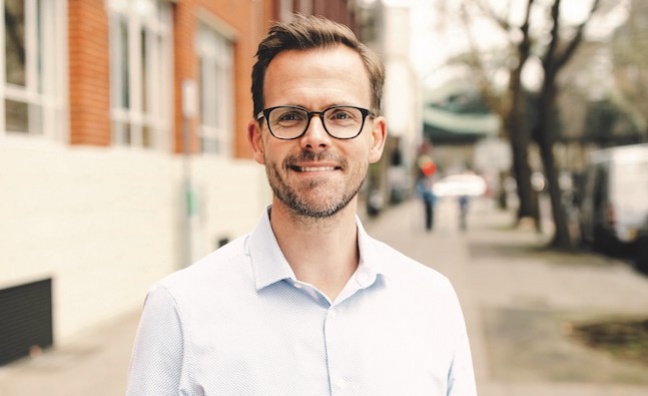Ivors Academy CEO Graham Davies says the trade body is making good progress with its campaign to “put the songwriter and composer centre stage”.
Last month’s DCMS Committee report on streaming made several recommendations in line with the trade body’s reform agenda for the industry.
The Ivors awards ceremony, which takes place at Grosvenor House, London on Tuesday September 21, will be a chance for the songwriting community to come together for the first time since 2019.
“It’s been a terrible 18 months so it’s really important to try and get back together and celebrate,” he told Music Week. “There are a lot of people who want to get back to the Grosvenor for that moment.”
As well as the recently announced category nominations for The Ivors, the Rising Star Award with Apple Music is back for its second edition with contenders including Allegra, Holly Humberstone, Kamal, Rachel Chinouriri and Willow Kayne.
“In our first year the Rising Star Award had the most applications for any award in the Ivors’ 65-year history, and we’ve seen a significant increase in applications in year two,” said Dan Adams, global head of creative services, music publishing at Apple Music.
“Some of those applications came direct from songwriters, some from managers, and many came from publishers of all sizes, so I feel like we’ve created something of real value to the community, and we couldn’t be prouder of the award and our growing relationship with the Ivors.”
Last year’s inaugural award for Ivors Academy members under 25 featured a shortlist including Griff, Amahla and Mysie, who went on to win and secure a label deal with mentor Fraser T Smith.
“The under-25 category is now our fastest growing category among the membership,” said Davies.
The Ivors Academy is busy campaigning for reforms on royalties that it believes could help the next generation of songwriters.
“In May last year, we put out a statement saying that we needed a fundamental review of the streaming market,” said Davies, who gave evidence to the DCMS committee. “We campaigned, we got the review and every single one of our arguments for change has been reflected in the parliamentary report.
“It is a victory in terms of a staging point but our work isn’t finished, we need to effect change. For us, it continues to be [a campaign] to put the songwriter and composer centre stage.”
Davies said ministers and the industry should engage with the report, which calls for a competition inquiry and urges the government to consider how to increase the value of the song to support writers.
After DSPs take their cut, around 55% of revenues from streaming go to recorded music rights-holders, while up to 15% goes to the publishing and songwriting sector. Historically, the disparity was partly due to the costs involved with distributing physical music.
“There is analysis that shows streaming is a song economy,” said Davies. “You’re seeing many services like TikTok where it’s about the song. It’s not the performance of the artist.
“So there’s a strong argument to be pushing for parity on royalties, not least because streaming is cannibalising broadcast. [Spotify CEO] Daniel Ek is on record saying that Spotify wants to eat up radio.”
MPs on the DCMS Committee also want the government to explore the practicalities of a musical works database to help reduce the amount of misallocated and unclaimed royalties.
The Ivors Academy revealed its latest research to Music Week on the scale of non-attributed revenue. It estimates that so-called ‘black box’ revenue is at least £500m a year for total global streaming publishing royalties attributable to the songwriter, publisher and other rights-holders.
“That’s money that doesn’t go through to songwriters and composers whose music is being streamed,” said Davies. “It’s not the DSPs’ fault, but that issue had to be raised and we’ve got the inquiry to agree that it’s a problem.”
The MPs’ report said the government should push the industry to come up with a minimum viable data standard within the next two years. They also want black boxes to stop being distributed pro-rata and for the revenue to be reinvested to support creative talent or develop solutions to royalty distribution issues.
“We’ve got to raise the voice of songwriters and composers,” said Davies. “We need to get more of the money coming through to them, because the recording doesn’t exist without the song.”
As well as campaigning on the issue of remuneration for songwriters, the Ivors Academy has been addressing diversity within the industry.
Applications for The Ivors have increased by 40% after a chart entry criteria was removed from the rules, which is designed to open up the awards to a more diverse range of songwriters.
“We are committed to equality and diversity,” said Davies. “We’ve been doing many things at the Academy to work on that, and one of those was looking at any barriers [for songwriting talent].”
Autumn elections will create a 40-strong senate, with up to 11 members appointed to the board.
“We’ve got more control over the diversity of our organisation and our governance, we’ve got gender parity on our boards for the first time in 75 years,” said Davies. “It’s a good springboard now with these new governance changes. So we will be reaching out, hopefully, to a much broader set of people to get involved in the Academy.”











